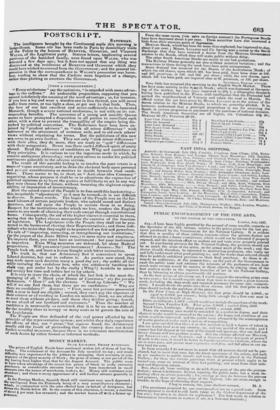[FROM A CORRESPONDENT.
" Every misfortune " say the optimists, "is attended with some advan- tage to the sufferer." An undeniable proposition, supposing that you extend indefinitely the meaning of the word advantage ; as, for instance, if you lose a leg and wear a wooden one in lieu thereof, you will never suffer from corns, or too tight a shoe, or get wet in that limb. Thus, the loss of our late excellent and never-sufficiently-to-be-lamented Monarch, though a severe national misfortune, is not without its cor- responding benefits. The accession of a young and amiable Queen seems to have prompted a disposition in all parties to conciliate each other, with a view to prevent the tranquillity of the empire being dis- turbed by political contention. The Reformers have long been en- joined by "prudent advisers" to "sink all minor differences" with reference to the attainment of common ends, and to aid each others' views without stipulating for terms. But the politicians of this new tars seem to go even further. They not only "sink minor differences" with their allies, they do more, they are ready to "split" differences with their antagonists. Never was there such a diffused spirit of amity abroad. Read the addresses of candidates on Whig and candidates on Tory principles. It is curious to see the ingenious mode in which, by evasive ambiguous phraseology, each party strives to render his political sentiments palatable to the adverse section. The result of this amiable feeling is to involve the poor voters in a maze of vague uncertainty, and to drive the electoral body upon personal and private considerations as motives to decide between rival candi- dates. There seems to be, in short, an " Anti-clear-idea Company " organizing, whose purpose it shall be so to adumbrate the expression of political opinions as to leave the parties at full liberty to act in any way they may choose for the future, without incurring the slightest respon- sibility, or imputation of inconsistency. How the sacred cause of the People is to fare amid this huckstering— this inequitable "adjustment," as it may be termed.—it is not difficult to discern. It must recede. The hopes of the People rest on the for- ward labours of certain patriotic leaders, who uphold sound and distinct doctrines, and call upon the People to sustain them in so doing. Respect for the institutions under which we live, renders the English averse to any mode of obtaining their ends except through constitutional forms. Consequently, the aid of the higher classes is essential to them, seeing that the higher classes monopolize the exercise of the function of legislators. The Legislature tells the People they shall not be pro- tected in the business of electing their Representatives ; and those indi- viduals who insist that they ought to be protected are few and powerless. To talk of "improving, correcting, or strengthening our institutions," as the jargon of the Juste Milieu runs,) is mere noise and emptiness. To improve them, you must have an instrument : but your instrument is imperfect. Even Whig measures are defeated, let alone Radical propositions. Will you amen t your instrument ? Answer—No ! The People look on, and learn a lesson fraught with bitter instruction. The truth is, that our Aristocracy find it convenient to spout Liberal doctrine, but not to enforce it. As parties now stand, they may trade upon such doctrine many a good day yet ; the public all the while imitating the credulous hen, who sits sedulously hatching her chalk egg, put under her by the crafty ( Whig?) henwile to amuse and occupy her time and induce her to lay others. It is easy to trace the chain, of which the last link is the most dis- couraging of all. " Mend your House of Commons," cry the pseudo Reformers. " How ?" ask the electors. " Send up Liberals." " We will if we can find them, but there are no candidates." " Why are there no candidates ?" Answer : " First, none but persons possessing 300/. a year in land are eligible ; second, they can't pay the expenses of their contest or cf residing in London six months ; third, we are afraid to trust them without pledges, and those they decline giving; fourth, we are afraid of our landlord and customers." Thus the number of candidates is necessarily so restricted, that it is by no means difficult for the wealthy class to occupy so many seats as to govern the acts of the Legislature. The People are thus defrauded of the real power afforded by the principle of the representative system ; and whilst they daily experience the effects of this, not " pious," but impious fraud, the Aristocracy cruelly add the insult of pretending that the country does not desire further remedial measures, because there is no vehement manifestation of such desire by either formal or informal methods.


























 Previous page
Previous page